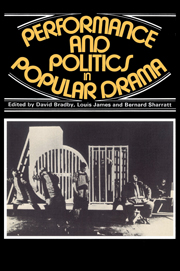 Performance and Politics in Popular Drama
Performance and Politics in Popular Drama Book contents
- Frontmatter
- Contents
- List of contributors
- Preface
- Acknowledgements
- PART ONE Spectacle, performance and audience in nineteenth-century theatre
- PART TWO Politics and performance in twentieth-century drama and film
- Introduction
- Meyerhold and Eisenstein
- Erwin Piscator's 1927 production of Hoppla, We're Alive
- Prolet Buehne: agit-prop in America
- Workers' theatre 1926–36
- The October Group and theatre under the Front Populaire
- Only the stars survive: disaster movies in the seventies
- PART THREE Problems and prospects
- Appendix: Tempo, Tempo
- Select bibliography
- General index
- Index of titles of plays, films, sketches
- Index of theatres, theatre companies and groups
The October Group and theatre under the Front Populaire
Published online by Cambridge University Press: 08 March 2010
- Frontmatter
- Contents
- List of contributors
- Preface
- Acknowledgements
- PART ONE Spectacle, performance and audience in nineteenth-century theatre
- PART TWO Politics and performance in twentieth-century drama and film
- Introduction
- Meyerhold and Eisenstein
- Erwin Piscator's 1927 production of Hoppla, We're Alive
- Prolet Buehne: agit-prop in America
- Workers' theatre 1926–36
- The October Group and theatre under the Front Populaire
- Only the stars survive: disaster movies in the seventies
- PART THREE Problems and prospects
- Appendix: Tempo, Tempo
- Select bibliography
- General index
- Index of titles of plays, films, sketches
- Index of theatres, theatre companies and groups
Summary
The Front Populaire government that came to power in June 1936, and lasted for nineteen months until January 1938, was the first French government since the revolution to promote the use of theatre for political purposes. Because of this, the development of different styles and forms in this period is particularly interesting for the history of popular and political theatre.
Cultural policies
The government, composed of Radicals, Socialists and Communists under a Socialist Prime Minister, Leon Blum, was a coalition of political forces that a mere six years earlier had been fiercely opposed to one another. After the sixth Communist International Congress in 1928, Western Communist Parties had agreed on a policy of refusing to co-operate with Socialist or Radical parties, denouncing social democracy as the first step on the road to fascism. This extremist line was adopted with enthusiasm by writers like Aragon: in his poem Front Rouge (1931), which earned him a five-year prison sentence (suspended), he wrote
Descendez les flics …
Feu sur Leon Blum
Feu sur Boncour Frossard Deat
Feu sur les ours savants de la social-democratie
But the failure of the German Communist Party to contain the rise of Nazism and the threat of a new war in Europe caused a rapid change in such violent attitudes: politicians and writers of East and West alike realised the importance of closing ranks against fascism. Between 1932 and 1935, as the threat from the right in France increased, Communists and Socialists joined forces once again.
- Type
- Chapter
- Information
- Performance and Politics in Popular DramaAspects of Popular Entertainment in Theatre, Film and Television, 1800–1976, pp. 231 - 242Publisher: Cambridge University PressPrint publication year: 1980
- 1
- Cited by


